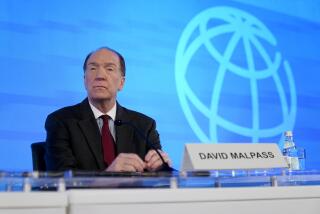Boost for World Economy
- Share via
A House Banking subcommittee, by a narrow margin, has appropriately approved U.S. participation in the general capital increase for the World Bank. But the decision does not mark the end of stubbornness by a curious coalition of friends and foes of the bank who have joined to try to block the funding for a variety of reasons.
Part of the problem now is that a number of members of Congress want to convert the World Bank into a major player in efforts to resolve the $1.2-trillion external debt of the poor nations of the world. The debt is indeed an extraordinary burden that is frustrating development and chilling the entire world economy. But the World Bank is not, and should not be, the central agent in resolving the problem. Its business is development--a job that it does very well, and a task of prime importance if the debt is ever to be resolved.
There are, of course, things that the World Bank can do to coordinate its lending programs for development with efforts to ease the debt burden. It has already done that in both Mexico and Brazil by timing new inputs of capital to coincide with efforts to tame debt-service costs. Furthermore, the World Bank can provide a continuing incentive for economic reform within the debtor nations by making loans conditional on those reforms, essential in themselves to overcoming debt-generated problems. It would be a dangerous mistake forthe U.S. Congress to mandate a World Bank debt role, however, or to do as some in Congress propose and impose a limit on bank lending for structural reform as opposed to specific project lending.
As matters now stand, the capital expansion of the World Bank has won the approval of 133 of the 151 member nations representing 77% of the bank shares. With or without the United States, expanded funding is likely to go ahead. There would always be a risk of second thoughts by other major members, however, should the United States fail to contribute.
The only nations that have failed to agree to the capital increase are destitute Third World nations. There is no good reason for any nation to hold back. It is the best development buy. Only 3% of the $74.8-billion increase actually is to be paid in. The remainder is callable, but, because of the prudent management of the bank, there has never been a call on this stand-by capital. The U.S. share of 18.5%, far below its fair proportion based on gross national product, translates into an actual payment of $70.1 million a year for six years. With the expanded capital, leveraged with private borrowing, the bank will be able to increase its annual lending programs from a level of $14.2 billion last year to $20 billion in the next decade.
Treasury Secretary James A. Baker III has given strong leadership to the capital expansion. An increasing number of congressional leaders are recognizing the importance of this expansion in terms of the global economy, including its effect on the U.S. economy, as well as the indirect role of bank lending on stabilization. It is encouraging now to see a majority in Congress recognizing the outstanding record of the bank and its importance to U.S. foreign-policy goals.
More to Read
Get the L.A. Times Politics newsletter
Deeply reported insights into legislation, politics and policy from Sacramento, Washington and beyond. In your inbox twice per week.
You may occasionally receive promotional content from the Los Angeles Times.









